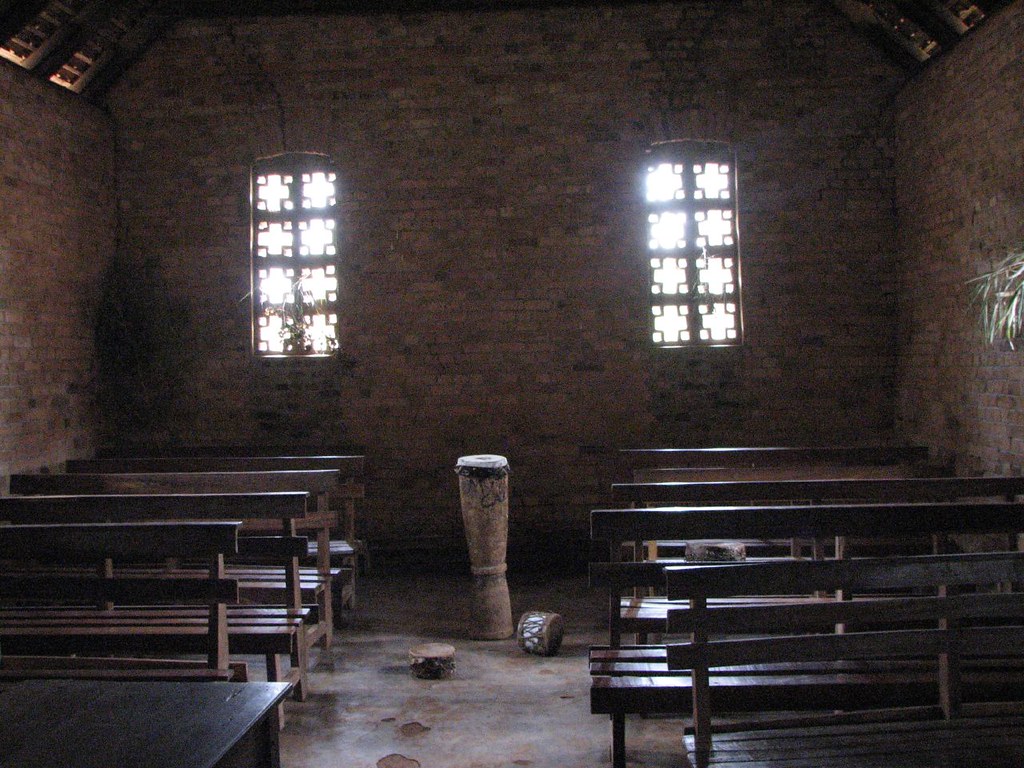Lungu’s Livingstone
Where does the idea that Zambia is a Christian nation come from?

Church transept (and instruments). Image credit Seyemon via Flickr CC.
During an October 2015 speech, Zambian president Edgar Lungu quoted a prayer attributed to the Scottish explorer and missionary David Livingstone. Kneeling on what would one day become Zambian land, Livingstone is said to have prayed, “Dear God, on this soil on which my knee bends raise a mighty Christian nation that will be a light to other nations.” (As Chammah Kaunda has pointed out, Lungu’s speech altered the quote slightly). This prayer is sometimes described as the missionary’s dying utterance, an idea that anchors the recent refurbishment of the David Livingstone Monument at the site of his death in Zambia’s Chitambo District. The contractor who oversaw the project told me that when his team arrived on the site they were shown a stake in the ground and given strict instructions to place Livingstone’s statue in that precise location—the exact point at which Livingstone was believed to have died, and where Zambia was first declared a Christian nation.
I have been studying Christianity in Zambia for more than fifteen years, and it is only recently that I have begun to hear church and government leaders quoting this (probably apocryphal) prayer from the country’s most famous missionary. Before that it was the late Pentecostal president Frederick Chiluba, rather than Livingstone, who was credited with making Zambia the only self-declared Christian nation in Africa. Chiluba initially made “the declaration,” as it is commonly known, during a press conference soon after his election in 1991. Five years later it was enshrined in the preamble to the Zambian constitution.
Since Chiluba’s presidency, subsequent Zambian heads of state have not made much use of the declaration—that is, until the election of President Lungu in early 2015. Lungu and the Patriotic Front (PF) government have rolled out a bevy of explicitly Christian policy initiatives, including the creation of a new Ministry of National Guidance and Religious Affairs, establishment of the National Day of Prayer as a public holiday, and a commitment in the Seventh Development Plan to draw on “Zambia’s Christian heritage as a standard of governance approach.” It was only after Lungu came to power that I started hearing church and state leaders attributing the declaration to Livingstone, rather than (or in addition to) Chiluba. I found this shift puzzling—why were those in power suddenly insisting that it was Livingstone who had first declared Zambia a Christian nation?
In responding to this question, the first thing to note is that not everyone is compelled by the government’s mobilization of Christian rhetoric and ideas, which have drawn sharp criticism from many Zambians. The government strategy in the face of such critiques has focused in part on drawing a distinction between its actions, which can always be attributed to the party or president’s political interests, and God’s divine plan for Zambia, which by definition extends far beyond such worldly concerns. Here is where Livingstone comes in.
Attributing the declaration to Livingstone, rather than Chiluba or any other recent political figure, makes the country almost primordially Christian. If the first Christian to walk into what is now Zambia uttered the first version of the declaration, then Zambia became a Christian nation at the first moment such a thing became possible. Understood in these terms, becoming a Christian nation was Zambia’s destiny; as the Pentecostal writer Liya Mutale puts it, “God had ear-marked [sic] us to be a Christian nation before we were formed” (2015, 5).
If the country has, in this sense, always already been Christian, then recent efforts to “actualize” the declaration, as the government puts it, are bigger than the current president or the ruling party. By suturing some of its most prominent policy initiatives to established Pentecostal ideas about God’s plan for Zambia, the government has effectively insulated itself from critique. For, if what the PF is doing is simply an extension of what God has been doing in Zambia all along, then any criticism of, for instance, the National Day of Prayer amounts to criticism of God rather than criticism of the ruling party. It is no surprise that such critiques do not go down well with Zambian Pentecostals, who are heavily invested in the idea that their country has a unique divine destiny.
What does this example tell us about Pentecostal politics more generally? Based on my earlier research with small, locally initiated Pentecostal congregations in Zambia, I have argued that this form of Christianity is a site of potential political critique. One of the core tenets of Pentecostalism is that God’s power and blessing are equally available to everyone regardless of status, which means that through Pentecostal adherence those without power or position or wealth can claim those things as their divine right. What the example of contemporary Zambian state politics shows us, however, is that these same ideas do very different political work when employed by the powerful. Pentecostalism’s egalitarianism can make it difficult to call out abuses of power, as those in authority can simply reaffirm the idea that all power—theirs included—comes from God, making God ultimately responsible for the outcome of their actions. Seen from this angle, it is possible to argue that Pentecostal adherence gets in the way of political participation, or at least political critique. While this is indeed sometimes the case, I think it is ultimately more productive to map out the multiple and contradictory ways that Pentecostal discourses are mobilized politically, rather than focus just on the points at which this religion serves the interests of the powerful. Only then can we fully appreciate the wide-ranging effects that Pentecostalism has on politics around the world, not least in Africa’s only self-proclaimed Christian nation.


